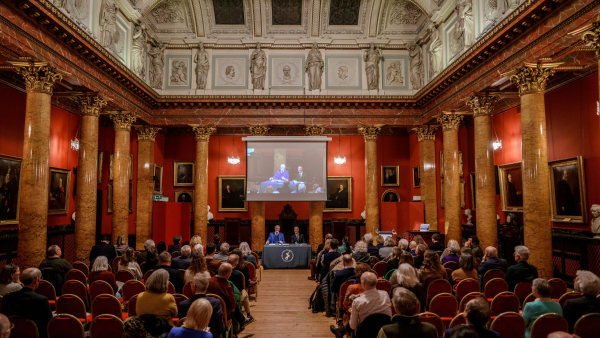This is the ninth in a series of eleven posts about ‘coordination theory’, a set of ideas about human motivation, organisational and social change. The first four posts set out key aspects of the theory. In posts five and six respectively, I described situations in which, one of the three active forms of coordination is dominant (‘monocultures) and where one form is under-articulated (‘deficit cultures’).
In the last two posts, I began to explore the nature and characteristics of the four forms of coordination in more depth, starting with ‘individualism’ and then turning to ‘solidarity’. In this post I turn to ‘hierarchy’, a form which we seem in equal parts to resent and to need.
Hardly a day goes by without a high-profile leader being exposed as inadequate or venal. In the last UK general election many voters said their biggest dilemma was deciding which of the two leading candidates for Prime Minister – Boris Johnson or Jeremy Corbyn – they detested least. From carmakers and banks to utilities, we have seen a steady stream of examples of high-level corporate irresponsibility. Even charity leaders have found themselves in the firing line for inflated salaries or turning a blind eye to sexual exploitation. The oft-cited Edelman Trust Barometer sets the bar for a sector to be trusted at a modest six out of 10 people. In its latest survey, NGOs, business, government and media all fail the test with last two being trusted by only a minority of the public across the world.
“It is almost inevitable that our need for leadership will be matched by our resentment of the way it is exercised.”
The Covid-19 crisis created new challenges for hierarchies. Some organisations, needing to be highly adaptive and having to trust and support people working from home, became less bureaucratic and controlling. Chief executives who had relied on sending out occasional missives found themselves doing weekly fireside chats from their front room. With a greater focus on wellbeing, authentic staff engagement became essential. The pandemic could be an important moment in moving to new types of leadership, ones that are more compatible with the fuller expression of our shared values and individual aspirations (what I call ‘full engagement’). But if the hierarchical way of doing things is to regain effectiveness and legitimacy, we need to understand more fully its nature, the problems that currently beset it and the reasons why it is almost inevitable that our need for leadership will be matched by our resentment of the way it is exercised.

Perhaps because I lead an organisation myself, I don’t buy the idea that leaders have simply become worse people or organisations more incompetent. In the modern world there has never been a sustained period in which people trusted those in power. To understand the state hierarchy is in we need to appreciate the inherent tensions within it as a motivation, worldview and form of social coordination. Authority is nearly always contested but the nature of the modern world is making its effective application ever more difficult. If (as I argued in my last two posts) the strength of individualism and the deficit of solidarity are today two marked features of our society, the failings and fragilities of hierarchies are surely a third.
“If the strength of individualism and the deficit of solidarity are today two marked features of our society, the failings and fragilities of hierarchies are surely a third.”
The hierarchical form of social coordination is based on the belief that stratification, order and expertise are the best way for groups to achieve their goals. It relies on using explicit ranking criteria differentiating and classifying people within a social unit, such as nation, clan, tribe or organisation. The family of hierarchical concepts include authority, leadership, bureaucracy, strategy, expertise, rules and regulations. It is the voice in our head telling us to do what we are told.
For those fortunate enough to be at or near the top of any authority ranking there is a strong reason for favouring the hierarchical form: it brings power, status and material reward. Other people in a hierarchy generally have little choice but to obey authority. Yet while power always lies behind authority, in democratic systems like ours where people have the freedom to make choices within the law, hierarchy generally persists because its subjects accept it.
Leaders are expected to manage and moderate between the competing claims of those they rule and serve. This is part of the political process but is just as true in all organisations. How, for example, does a charity leader balance the views and interests of Trustees, staff, service users, funders and the wider public? From the perspective of coordination theory, a recurrent challenge is to balance the conflicting dynamics of individualism, with an emphasis on individual autonomy and competition, and solidarity, with its emphasis on justice and the interest of the collective.
But, as well as this balancing act, people in charge have their own opinions and interests. Part of our ambivalence towards all kinds of leaders is the sense that, whatever they say about responsibility and the burdens of office, they tend to seek more power and more privilege for themselves. This is partly a reflection of leaders pursuing their own interests, but is also the inherent tendency for leaders to think all problems require the exercise of authority.
But why do we need hierarchy at all? Libertarians and anarchists are suspicious of the very idea of one person being granted authority over another. While most of us think a leaderless world is impractical, we often experience authority as unreasonable or onerous, even oppressive. Given that the exercise of authority can infringe our individualistic desire for autonomy, while the concentration of power runs against our solidaristic commitment to justice and equality, why do we spend so much of our lives letting the people who run hierarchies tell us what to do?
Perhaps we can gain insight from the ubiquity of hierarchy as a form of coordination in the animal kingdom? Primates exhibit an impressive array of dominance models, from the alpha-male led troupes of gorillas to the female-run groupings of lemurs and Japanese macaques. Lobsters live in hierarchical configurations and appear to get happier, releasing more serotonin, as they climb the status ladder, as do chickens (hence the term ‘pecking order’). But human hierarchy has its own distinctive foundations and characteristics.
“When groups need to act together in the face of external threat, having a recognised mechanism for decision-making will make it easier to respond quickly and effectively.”
Having a leadership structure provides advantages in terms of resilience. When groups need to act together, for example, in the face of external threat, having a recognised mechanism for decision-making will make it easier to respond quickly and effectively.This outweighs the fact that bad leadership may on occasion be worse than no leadership. As the evolutionary biologist Mark van Guyt argues: “Leading and following are strategies that evolved for solving social coordination problems in ancestral environments, including in particular the problems of group movement, intragroup peacekeeping, and intergroup competition.”

The price humans pay for our greater cognitive development is that it takes us much longer than other species, both in absolute terms and relative to our lifespan, to be socialised and become independent. At the heart of early human development is the relationship of children to parents or parental proxies. This is an inherently hierarchical relationship in which children accept the authority of their elders as the corollary of the care and education they need to achieve maturity. The process by which we move from utter dependence on our parents to eventually seeing ourselves as separate human beings, comprises the drama of early child development. Indeed, the difficult shift from perceiving parents as gods to recognising their many frailties and foibles is analogous to our more general ambivalence towards authority. For some in the psycho-analytic tradition it is the drama that defines our character for life.
Our predispositions to authority may be shaped by evolution and childhood experience, but every individual hierarchical ranking has its own rationale. In hunter-gatherer groups, strength, speed and endurance might have been among the factors that led certain individuals to have a greater status or authority. In the modern world, the relationship between talent and the attainment of positions of authority is more attenuated and contested and there are also disagreements about the capacities and qualities needed to lead effectively. Nevertheless, hierarchy continues overwhelmingly to be rationalised in terms of the superior qualities of those at the top.
Some leadership is imposed by continuous force or threat, but in societies like ours most is not. Legitimacy – the largely voluntary acceptance of the authority of the ruler – is essential to the resilience of hierarchies. Fortunately, in understanding different forms of hierarchy there is an invaluable starting point in the work of one of sociology’s founding fathers, Max Weber.
Traditional, charismatic, rational
“Legitimacy – the largely voluntary acceptance of the authority of the ruler – is essential to the resilience of hierarchies.”
Before I describe Weber’s thinking, I need to make a brief theoretical point. In the rest of this post I will describe three different historical ways of legitimising authority before making a further distinction between ways authority tends to be justified in a society like modern Britain. Coordination theory (the focus of this series of posts) suggests that the interplay of its core forms (individualism, solidarity, hierarchy and fatalism) has a fractal quality. It is played out at every level from the nation state to the kitchen table. Reflecting this, the justifications for leadership I am going to explore in themselves reflect this pattern: some legitimations are more solidaristic in their nature, some more individualistic and others more purely hierarchical. Hopefully, this will become clearer as I go along.
As a sociologist and historian, Weber was interested in why social order persists and why it breaks down. His studies led him to identify three major ways in which authority has been legitimised. In reality, these blur into each other, but Weber’s method was to identify the exemplar forms; what he called the ‘ideal type’.
The first basis of hierarchical legitimacy, the ‘traditional’, draws on the past to justify the present. It is the most purely hierarchical; leadership for the sake of leadership. Here leaders rely less on claims about their personal qualities and more on their birthrights. The most common basis of legitimacy is hereditary. The authority granted by lineage then extends beyond the immediate family to personal retainers or allies, such as vassals or tributary lords in a feudal regime.
The birth of civilisation and the logic of hierarchical social organisation are inextricably linked. Until relatively recently, from the point at which human beings started to stay in one place and grow into larger groups, the traditional model has been the norm. Chiefs, kings, queens, emperors and even religious leaders have inherited their status by claiming a privileged relationship to God or gods. With some exceptions, like the Athenian experiment in democracy, those who challenged traditional legitimacy did so only to argue that one lineage should be replaced by another. Although most people in these societies saw traditional hierarchy as entirely natural, legitimacy still needed to be buttressed. Rulers tended to add extra force to their claim through projecting charismatic appeal or special talents or by highlighting their achievements on behalf of the group. Wherever leadership exists there is always some kind of public relations operation.
The millennia-long claims of religious and monarchical authority were, respectively, the chief targets of the Reformation and the Enlightenment. Because of the changes in public attitudes and social institutions wrought by those revolutions of the mind, legitimacy based on tradition is much diminished in scale and power in modern society. Although in the UK and some other countries a hereditary monarchy still exists – and, of course, inherited wealth and privilege plays, if anything, an expanding a role in social stratification – the idea that people should have power over us simply by birth status flies in the face of modern expectations and attitudes.
Weber’s second form of legitimacy, ‘charismatic authority’, is based on the personal qualities attributed to the leader. Such leaders are perceived as possessing the right to lead by virtue of special powers, unique qualities or acts of heroism. Charismatic leaders claim an almost mystical capacity to embody the will of the people. Followers respect the authority of charismatic leaders because of their apparently extraordinary abilities, or as Weber sometimes put it, their “divinity”, not because of tradition or legal rules.
During the 20th century this form of leadership was often associated with revolutionary or nationalistic leaders such as Lenin, Mao or Hitler. Although personality cults were developed for propagandist reasons, personal charisma was tied not so much to the magical qualities of the individual as to their claim to embody the power of ideology or the fulfilment of national destiny.
Leaders of political parties, businesses or campaign organisations will tend to promote or defend themselves by claiming material achievements or verifiable and salient qualities. Yet, alongside this they or their advisors will often also seek to project a more amorphous source of legitimacy: a leadership ‘X factor’. This may be expressed in terms of largely intangible abilities such as being able to connect with people, to tell stories of redemption, to overcome the odds or to personify certain values.
As I described in the last post, the modern liberal assumption that solidarity is a diminishing basis for social action has been belied both by psychological research and by the rise of nationalist and populist political movements. It is no surprise that charismatic leadership – the form that most summons up a solidaristic response – is a recurrent part of the populist story. Think, for example, of the memorable moment in July 2016 when Donald Trump called out to his adoring supporters “I am your voice”.
Until quite recently it might have been assumed that charismatic legitimacy, damned by its association in the 20th century with tyranny and terror, was in inexorable decline eclipsed by the dominance of the rational legal form. Even with the rise of populism, its opponents comforted themselves by assuming that the complexities and trade-offs of ruling in the 21st century would enforce a reality check. Charismatic appeals are vulnerable to the exposure of individual flaws or to the vicissitudes of public office. The pace of the modern world, particularly communication, means that charismatic appeal can sometimes be quickly and widely established – as we saw with figures like Tony Blair, Barack Obama or Emmanuel Macron – but as all these figures could attest, politicians who have been carried to office on a wave of charismatic appeal tend to be subject to even greater public disillusionment when the poetry of campaigning is replaced by the prose of government. It was assumed that only when leaders can manage their image through control of the media and the suppression of dissent – as in modern North Korea and Russia – that an appeal based on personal charisma is likely to be sustained for long, and only then by societies becoming more dysfunctional and brittle.
But leaders have learnt from history. The politics of modern populism is an exercise in sustaining charismatic leadership in office. Today’s strong man populists seem to have found ways to borrow from the playbook of authoritarian leaders while maintaining their claim to be the true, democratic, voice of the nation. Key common ingredients of this model – often referred to as ‘illiberal democracy’ – have been developed by leaders ranging from Berlusconi in Italy, Trump in the US to Orban in Hungary. One of these ingredients is explicitly to reject the idea that the achievement of consensus, let alone unity, is a leadership responsibility. Instead populists continually define their responsibility in terms of championing their favoured group while openly disparaging others. A second aspect is an unwillingness to conform to rational-legal expectations such as abiding by the rule of law, being intellectually consistent or even competent.
Illiberal democratic leaders continuously straddle the line between rational-legal and charismatic authority, playing enough by the rules to avoid a constitutional challenge, pushing the boundaries of legality, while also revelling in their personal capacity to mock convention. Boris Johnson may be at the benign end of the populist spectrum, but he seems to revel in displaying both the strengths and weaknesses of charismatic authority. Many populists have learnt from what are said to be Vladimir Putin’s golden rules of leadership: ‘never be predictable, always be interesting’.
Populist leaders may deliberately challenge conventions and expectations, but as long as they want to wear the mantle of democratic legitimacy, they cannot completely turn their back on Weber’s third form of legitimacy: the rational-legal. Even populists claim to have risen through merit and to be willingly judged by the public on the results they achieve. Moreover, regardless of what is happening in the sphere of formal politics, rational-legal authority is overwhelmingly the predominant form of hierarchical legitimation across the rest of society. Indeed, Weber, saw it as the defining feature of modernity and it is the form of legitimacy most aligned with an individualistic worldview.
“Rational-legal authority is overwhelmingly the form of legitimacy we most often confront in our day-to-day lives. It is the form we have to rely on if we are to meet future challenges. Yet on every front it is also failing and under attack.”
Rational-Legal authority is based on rules applied administratively and judicially in accordance with explicit principles. Those who administer the rules are also appointed or elected by legal procedures. Leaders are subject to rules that are supposed to limit their powers and to separate their private lives and interests from official duties and responsibilities.
It is the model that underpins our democratic system, provides the foundations of organisational control and is reflected in the influence of scientific expertise. It is overwhelmingly the form of legitimacy we most often confront in our day-to-day lives. It is the form we will have to rely on if we are to meet future challenges. Yet on every front it is also failing and under attack.
Democratic, organisational, scientific
In the remainder of this post I develop a second classification. Modern hierarchical legitimacy, Weber’s rational-legal form, has democratic, organisational and scientific foundations. Each is under pressure.
Until very recently, democracy as an idea and ideal seemed to be triumphant, despite the scepticism or outright hostility to the concept from many philosophers from ancient Greece onward. The number of countries that are functioning democracies, even if not always functioning well, continually rose in the decades after the war and particularly after the fall of the Berlin Wall. When elected politicians are attacked, their critics often rally behind the concept of democracy, pointing to opinion polls claiming to show that a majority stand on their side of the issue. Populism may threaten the broader framework of liberal constitutional systems, but it claims, if anything, to be more democratic than the elites it challenges.
But even while the idea and ideal of democracy were seemingly triumphant, the institutions of democracy and the people who exercise authority within them, have suffered from low and declining public support.

In the face of declining trust and participation there has been lots of hand wringing but little action. Partly, because those in authority are unlikely to change the norms and rules of a system from which they have benefited, but also because it seemed liberal democracy was the only show in town (Francis Fukuyama’s famous ‘end of history’).
But now the trend towards more counties becoming functioning democracies has turned back. This becomes particularly apparent if the label is restricted to those that observe the other key features of a liberal democratic system, including respect for the rule of law and freedom of speech and association. Furthermore, there appears to be significant increase in the number of citizens – including young people – who prefer ‘strong’ government to constitutional government. The apparent success and resilience of some autocratic regimes, particularly China, have also contributed to the questioning of liberal democracy as even, in Churchill’s famous formulation, the ‘least worst’ system.
The shrinking world has generated challenges such as mass migration and more intense economic competition, which governments and other hierarchies find hard to solve. Growing interdependency is inherently difficult for national political authority as it requires states to pool sovereignty to address these challenges and others, such as climate change, cyber-crime and terrorism.
“The pioneers of the internet rightly saw it as a major challenge to existing systems of hierarchical control, but few predicted that the online world would end up handing unprecedented wealth and power to the owners of Facebook and Google.”
Globalisation and technological change have been mutually reinforcing mega-trends. The growing complexity generated has, among other things, exposed the generally slow moving and bureaucratic nature of governmental decision-making and action. The advent of 24/7 news and social media has contributed to an ever more unpredictable and hostile environment for political discourse and decision-making. Again, what would have been challenges to democracy in any case, have been made more problematic by the way financial and technological innovation has been driven, without political challenge, by commercial imperatives. The pioneers of the internet rightly saw it as a major challenge to existing systems of hierarchical control, but few predicted that the online world would end up handing unprecedented wealth and power to the owners of Facebook and Google.

Trying to adjust to globalisation and technological change often seemed to reduce the political leadership of liberal democracies to the servants of a faceless global power system. This begs the question; what is national democracy for? A trademark of populism has been a promise to put nation first and a willingness to defy the institutions and norms established through multilateral institutions, from the European Union to the World Trade Organisation.
The global environment is challenging for democratic institutions, but they have also failed to adapt to shifts closer to home. In particular, the principles and practice of democratic representation have come under growing strain. This is partly about under-representation. From Trump and Brexit, to the gilet jaune protests in France, protesting the discrimination of the urban elites against the ‘periphery’, this sense of a divide between the establishment and the rest is a recurrent feature of public anger. But the internal dynamics of political parties under pressure are also increasingly problematic. From funding scandals to the capture of parties by groups of activists unrepresentative of ordinary supporters, the idea that parties intermediate between the public and politicians has been replaced by the justifiable impression that ambitious representatives consistently put their own interests and those of their party ahead of the public’s.
Overall, most of us continue to accept the idea that we must be led and, at least for now, the principle that those who lead should be democratically elected. But mainstream politicians and the public are locked in a loveless and increasingly dysfunctional relationship in which the latter seems more convinced by alternatives to liberal democracy than by the belief it could be renewed.
In response we are seeing around the world a range of innovations in both democratic process and governmental practice. There has, for example, been the steady growth of the use of deliberative democratic methodologies. However, these innovations still tend to remain at the margins of politics and policy, too easily discarded or ignored when vested interests are threatened.
“Mainstream politicians and the public are locked in a loveless and increasingly dysfunctional relationship in which the latter seems more convinced by alternatives to liberal democracy than by the belief it could be renewed.”
The state of democracy is a vital debate but for most of us it feels peripheral to our lives. But the rational-legal model is also dominant in the innumerable organisations with which we daily interact. For example, despite a rise in self-employment, more than 80 percent of working adults in the UK are employees; unless we are the boss, most of us have a boss. Even more than our adherence to the policies and laws set by politicians, doing what our boss requires of us every day at work so that we get paid, is the way hierarchy most pervasively influences the lives of most people. As well as the relationship of employee to manager and employer, the principles of organisational hierarchy lie behind everyday models of accountability. When things go wrong for us as citizens, consumers or employees, we demand to speak to ‘whoever is in charge’.
Organisational hierarchy has been challenged by many of the factors impacting democratic legitimacy, particularly complexity and pace of change. Expectations of transparency, the speed at which information travels and the capacity of anyone to share ‘news’, means organisations and their leaders are never far from the possibility of reputational disaster. Also, like democratic institutions, leaders of other organisations have failed to reform systems of control and authority, which are arguably increasingly unsuited to modern challenges. There have been many experiments in radically different ways of running organisations but, like innovation in government policy, these remain rare in the face of the underlying logic of organisational survival.
In the same way that democratic authority derives ultimately from the votes of citizens, organisational authority also derives from one source: property. All organisations must ultimately have owners. This might be the state, an individual, a group of shareholders or charity trustees. While for most employees the boss is not the ultimate owner of the organisation, this is where the legitimacy of organisational hierarchy rests. The owners appoint agents – chief executives, vice chancellors, principals and so on – and the agents in turn appoint and manage subordinates reaching down to the factory, office or shop counter.
The authority of these agents, however senior or well remunerated they may be, is ultimately conditional. The property holders or trustees devolve authority to agents on the explicit understanding that the latter will act in the interests of the former. A big issue in many organisations is the degree of latitude afforded to leaders in the interpretation of their role and responsibilities. This involves, on the one hand, owners devolving the freedom for leaders to weigh up competing organisational imperatives while, on the other, trusting that leaders will not put their own individual interests above those of the organisation.
Certain modern ideas have been as corrosive for the legitimacy of organisational leaders as they have for our political masters. For example, rational choice theory assumes that leaders will act purely as utility maximising, economic actors and prioritise their own self-interest. The field of ‘agency theory’, which sprang up in the 1970s, assumes that leaders with power devolved to them by owners cannot be expected to act on anything other than their own interests. The main consequence of this assumption is that leaders must be subject to the closest possible scrutiny largely in the form of objective performance data. The strongest expression of this in the business world, famously endorsed by economist Milton Freidman, is the idea of shareholder value; that leaders should be continuously and ruthlessly judged on their capacity to generate immediate returns to investors. By focussing on one group of company stakeholders, and only on their immediate interests, this principle is inherently at odds with the notion that leaders should have wider responsibilities. In 2009, former GE CEO and management guru, Jack Welsh famously described shareholder value as “the dumbest idea in the world”. Since then shares have been ever widely dispersed, and as more and more trading is performed by computer algorithms using high-frequency trading systems where information travels at unfathomable speeds, business leaders find themselves judged by ‘owners’ who are inanimate and unaccountable.
The use of data to deal with the agency problem of self-interested leaders has been equally pervasive in the public sector, especially with the rise of new public management (which I discussed more fully in my post on deficit cultures). Performance data, league tables and inspection regimes have become the day-to-day obsessions of the public sector, and increasingly, of charities large and small which rely on public funding. Measurement is important, but when standard metrics become the only means of judging organisational stewardship, it has the effect of diminishing the idea that leaders add value by exercising judgement. Weber saw bureaucracy as the inevitable and, in many ways, welcome embodiment of rational-legal authority. But he also identified the tendency of such systems to end up privileging the rationality of means (rules and regulations) over the rationality of ends (ultimate purpose). Anyone who has to do things at work, not because they make sense but because they are required to by targets or regulations imposed on organisations, will recognise Weber’s diagnosis.
Measurement is important, but when standard metrics become the only means of judging organisational stewardship, it has the effect of diminishing the idea that leaders add value by exercising judgement. Weber saw bureaucracy as the inevitable and, in many ways, welcome embodiment of rational-legal authority. But he also identified the tendency of such systems to end up privileging the rationality of means (rules and regulations) over the rationality of ends (ultimate purpose). Anyone who has to do things at work, not because they make sense but because they are required to by targets or regulations imposed on organisations, will recognise Weber’s diagnosis.
The process by which leaders have been placed under ever greater pressure to deliver immediate results, either directly commercial or through systems which ape commercial imperatives, has generated a tragic irony. Faced with diminishing autonomy, every greater scrutiny and risk of failure, many leaders have both sought to game the systems in which they are trapped and also to compensate themselves for the growing pressures and risks they face. From fat cat salaries for chief executives, to political or corporate malfeasance, to the gaming of performance targets by public sector managers, today’s leaders seem all too willing to live down to our declining expectations.
The overriding impression I gain from speaking to organisational leaders is recognition of the need to do things differently and even some sense of what an alternative model of leadership might be. But alongside this is a sense that the broader systems in which most organisations operate make radical change difficult and dangerous.
“From fat cat salaries for chief executives, to political or corporate malfeasance, to the gaming of performance targets by public sector managers, today’s leaders seem all too willing to live down to our declining expectations.”
Democratic sovereignty lies in the popular will, while organisational authority lies ultimately in property ownership. In the worlds of science and technology, authority lies in knowledge. The linear conceptual model of knowledge as a ladder, stretching from our first school lesson to world leading levels of expertise, is our default. The education systems embody as perfectly as any the classic pyramidal hierarchical structure: all children are required to pursue basic qualifications in mathematics, a smaller number will choose to take an advanced course, a smaller number still will study mathematics as a university degree. Of these students the best – if they aren’t tempted by salary offers from the financial sector – may opt for post-graduate studies and an academic career. Then within the community of professional mathematicians there will be a further academic hierarchy reaching up to the heights of Nobel prize winners. While everyone must follow the rules of scientific rigour, implicit in this pyramid is that people at every level defer to the expertise of those at higher levels.
The relationship between democratic and knowledge-based legitimacy is a source of frequent debate and sometimes conflict. Although recent political upheavals appear to buck the trend, generally the citizens of countries like the UK indicate a preference for rules based on ‘objective’ knowledge rather than ‘subjective’ political judgement. As we have seen during the pandemic, mainstream politicians have constantly sought to bolster their credibility by claiming to be ‘acting on the science’. Similarly, many organisational leaders have used management consultants to offer an expert legitimacy to their actions.
Meanwhile, businesses, from food processing to pharmaceuticals, have found themselves under greater pressure to show that their products are safe and effective, not simply profitable. Even the charitable sector has found itself under greater scrutiny when it comes to technical evidence for the efficacy of its interventions.
However, although it has sometimes seemed that the public would happily opt for a Platonic world in which knowledge was the dominant foundation for hierarchical legitimacy, there are also forms of resistance. These often involve a clash between the respective claims of values and knowledge as the basis for deciding what matters and what is best to do. We are not purely rational: power, values and emotions matter. If we do not identify with or trust the messenger, then the message is unlikely to get through.

Whether resistance to climate science in the US, the explicit rejection of experts by Brexit campaigners and voters in the 2016 European Union referendum, or the anti-vaccination movement that predated and has now grown since Covid-19, expert evidence is sometimes explicitly rejected in favour of systems based on other criteria like instinct, faith or political conviction. Philosopher Thomas R Wells has suggested that our susceptibility to fake news may represent the replacement of the idea that there is an objective truth with a perspective, derived from free market arguments and consumer behaviour, that all value is personal and relative. Having said this, it is noteworthy that even when campaigners or politicians reject scientific orthodoxy in areas like evolution, climate change or vaccination, they often use alternative, scientifically couched, arguments to buttress their position. The critics of scientific consensus challenge it not with folklore but with bogus science.
Even if there was not a political assault on the capacity of experts to guide us, advances in science and technology are throwing up new dilemmas, which cannot be resolved by recourse to knowledge alone. Just because something can be done, does not mean it should be done. From the genetic manipulation of foetuses, to the possibility of extending life ever longer, from the scope of artificial intelligence to manipulate us, to the development of drugs that can make us happier, more intelligent or even more benign, the idea that what knowledge makes possible is also what is best for humanity is likely to come under greater scrutiny. As science and technology creates possibilities challenging deep-seated ideas about human nature and flourishing, the idea that more knowledge for experts means more progress for humanity might start to be more loudly questioned.
The issues are widely acknowledged. There are, for example, many commendable initiatives seeking to engage the public in discussion about the ethics of AI, but, once again, these debates are made more difficult by an accurate public perception that scientific and technological change is often driven more by commercial interests rather than public benefit.
Hierarchy is beset by challenges, but we still need it
“Hierarchy is a necessary element in ‘fully engaged’ solutions...one that is in many ways even more necessary in these complex and perilous times.”
To sum up, 21st century hierarchies in countries like our own are beset by challenges. The modern world – ever more complex, ever faster moving – creates new challenges while also making traditional organisational methods less effective. Declining deference and the expectation of greater transparency deny leaders the time and space to weigh up and trade off the demands made upon them, while any sign of organisations failing to live up to their promises can result in overnight disaster. For many commentators the solution has to be new types of leadership: more open, more adaptive and more emotionally intelligent. Yet, in politics at least, things seem to be going in the opposite direction.
Many of the loudest critics of hierarchical systems draw a contrast between the failings of those systems, and what they claim to be the inclusive, dynamic, adaptive qualities of networks. But from the perspective of coordination theory, hierarchy is a necessary element in ‘fully engaged’ solutions – where each motivation/worldview/method of change is expressed and aligned – one that is in many ways even more necessary in these complex and perilous times. A world without hierarchy is a pipe dream. The question of how we adapt the hierarchical form of social coordination to meet the challenges of the modern world, and in so doing enable it to summon up and balance our core motivations, is one of the most pressing we face.
Related articles
-
The 2024 Angus Millar Lecture
Fellowship news
Fionna Monk
The 2024 Angus Millar Lecture was led by award-winning novelist Andrew O’Hagan on the theme of 'Art, Literature and Truth in the Era of Fake News, Algorithms and Artificial Intelligence'.
-
Facing the future: Scotland's challenges
Fellowship news
Fionna Monk
On 26 November 2024, RSA Scotland discussed Scotland’s future with nine engaging speakers addressing various challenges facing the country. The venue was resonant – a former committee room at the French Institute used in its early days by the Scottish Parliament. This successful event was chaired with deftness and humour by the former Presiding Officer at the Parliament, Rt Hon Ken Macintosh.
-
Improving health through economic development
Report
Anna Markland Liv Chai Nicholas Heslop
The RSA have created an Economies for Healthier Lives Programme Coaching Resource that pulls together our experience, insight and case studies from the five ‘Hubs’. This resource is designed to support those looking to learn from and replicate this work to get supported at every stage, from project inception through to legacy planning.




Be the first to write a comment
Comments
Please login to post a comment or reply
Don't have an account? Click here to register.